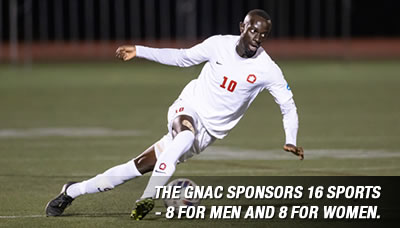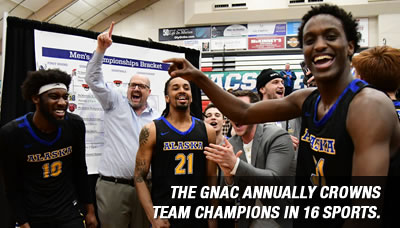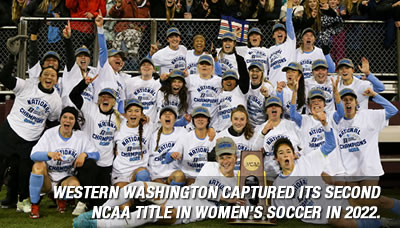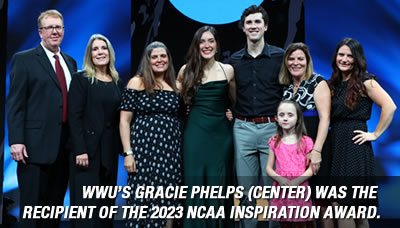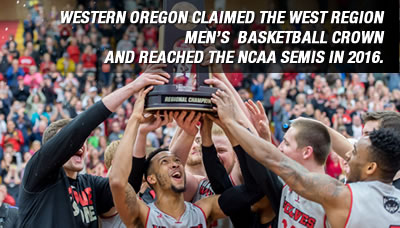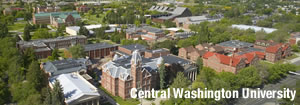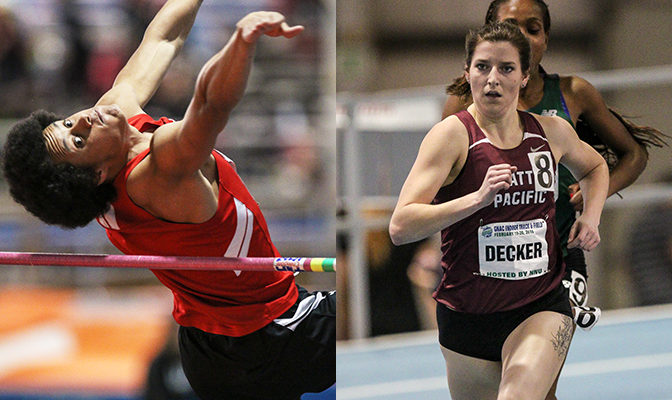Saturday, March 12, 2016
by Mark Moschetti, Seattle Pacific Sports Information
PITTSBURG, Kan. – The way Mikel Smith sees it, the sky is the limit for his high jumping possibilities.
After his All-American performance at the NCAA Division II Indoor Track & Field Championships, the Saint Martin’s junior has firm plans to get much closer to the sky now that he’s ready to head outdoors for the spring season.
Smith cleared 6 feet, 11 inches on Saturday afternoon, grabbing the second-trophy in the Robert W. Plaster Center at Pittsburg State University. He wasn’t ready to stop there, but some days, the bar just doesn’t want to cooperate.
“I tried to clear 7-1 today, and it didn’t happen,” Smith said. “I had a very good look at it. I just have to be quicker over the bar. Next time, we got that. I know what I need to fix, and I’m excited about competing outdoors.”
Smith, who won the Great Northwest Athletic Conference championship on a tiebreaker last month by clearing 6-9, was thrilled that he got to compete in front of his family as well as a former coach.
“I just went out there and did my thing,” he said.
Smith was fine going home with second place on Saturday (he was one of four to clear 6-11 and again got the tiebreaker), but don’t get the idea that he’s ready to keep settling for that.
“I actually came in thinking I was going to win it because I know what I can do,” he said. “I came out here and got second, and I’m pretty excited about that. But moving on, I’m going to win outdoor. (Going) 7-5 or better is my goal for outdoor. My outdoor PR is 6-11, but I know I’m going to beat that.”
HOW CLOSE CAN YOU COME?
On the long flight home to Anchorage, Seawolves seniors Cody Thomas and Karolin Anders probably are going to be thinking about every one of their events in the heptathlon and pentathlon and pondering where they might have picked up an extra inch here or dropped an extra tenth of a second there.
Thomas finished third in the men’s hep with 5,538 points. That was just one point out of second place and 16 shy of first. He started the day in fourth after what he called “pretty bit of a downer first day.” But a monster performance in the pole vault – he wound up at 14-9 and cleared three bars beyond his previous best of 13-11.25 - got him into the title mix.
“Look who found his pole vault legs … that’s points, man!” he exclaimed after getting over 14-5.25, then added later, “We’ve been working with stuff. I got on a big pole, so it helps out a lot being able to jump on a stick that kind of does what you want it to.”
Reflecting on his close third-place finish, “I said, ‘Well, I’m going to have to come in clutch on the second day. The (60-meter) hurdles came in well, the pole vault was a huge PR.and I had a huge PR in the 1,000 (2:41.77 with a big surge up to third place in the hep-ending race). I gave it everything, and you can’t do much more than that. One point out of second place … I don’t even know what that is (for another point) in the 1K.”
Anders was seventh in the women’s pentathlon with 3,806 points. While Salcia Slack of New Mexico Highlands won easily with 4,172 points, Anders was one of six competitors bunched in the 3,800s. That ranged from the 3,899 of second-place Shelby Bonzer of Chadron State to Anders’ 3,806.
“I think this was the hardest meet I’ve had, mentally,” said Anders, who also was an All-American sixth in Friday’s individual high jump. “I’ve hard meets before, but this one just wasn’t going my way from the beginning. The coaches called me over (before the pent-ending 800) and I said, ‘It’s OK, I don’t even want to know (what the scores are). They told me how close it was, and I was just blown away.”
DECKER KEEPS GETTING BETTER – AND FASTER
For the first two-and-a-half years of her college running career, Lynelle Decker could always be counted on to make the national meet – whether it was cross country, indoor track, or outdoor track.
But lately, the Seattle Pacific senior has been doing much more than just making the meet.
She’s making waves once she gets there.
Decker continued that trend on Saturday afternoon, coming from fifth place at the bell lap all the way to a second-place finish in the 800 meters at the NCAA Division II Indoor Track & Field Championships.
Her time of 2:07.52 was a personal best by nearly two seconds, and broke the school record of 2:07.57 set in 2008 by legendary distance star Jessica Pixler.
“A lot of talk has been going on this weekend about school record, especially J-Pix,” Decker said of the former highly decorated Falcon star. “I never thought I would ever get an SPU record just because she is an amazing runner and her name is plastered across the board for many distances. … I’m just flabbergasted.”
Decker, who has been to 10 NCAA meets in 11 competitive seasons at Seattle Pacific (three cross country, four indoor track, three outdoor track) was part of three All-American performances in two days: the distance medley relay on Friday (fifth place), the 800 on Saturday (second), and the 4x400 relay on Saturday, as she ran the No. 2 leg on the team that eventually took third place in 3:42.44 and broke a 3-year-old school record.
STILL HAD SOME LEGS LEFT
With his gutsy 1,600-meter anchor leg performance for Western Oregon’s fifth-place distance medley relay team on Friday night, sophomore David Ribich could have been excused if he’d had tired legs or an empty fuel tank for Saturday’s mile finals.
He had plenty of leg and plenty of fuel.
Ribich came from seventh place with a big move in the final 600 meters to snag fourth in Saturday, clocking 4:14.22, less than a second behind winner Oliver Atchison of Adams State.
“Last night after the DMR, I felt weirdly good to where I was like pretty confident that I could place in the top eight for finals,” Ribich said. “I was coming out to try to do my best.”
He knew it would be a tactical race, and he was right.
“After 600 meters, I stopped worrying about who was behind me and who was in front of me,” he said. “When we came to the bell lap (300 meters left) and I was in fourth place, I said I just gotta go out now and give it my all and finish as fast as I can.
As close has he came to first, Ribich wasn’t unhappy with finish fourth. That was well inside the top eight for his second All-American award of the meet.
It certainly beat the alternative.
“The pain of all that is there’s always a ninth-place finisher in the final,” he said.
BY THE NUMBERS
--Alaska Anchorage was the top GNAC men’s team, tying for 14th place with 16 points.
--The Seawolves also were the leading women’s team, taking ninth with 20.5 points. Seattle Pacific was close behind, tying for 11th with 18.
--The GNAC had 18 All-American Performances:
-- Women’s 800: Lynelle Decker (SPU) 2nd.
-- Women’s 3000: Joyce Chelimo (UAA) 6th, Shannon Porter (StM) 8th.
-- Women’s 5000: Joyce Chelimo (UAA) 2nd.
-- Women’s distance medley relay: Alaska Anchorage 4th, Seattle Pacific 5th, Simon Fraser 7th.
-- Women’s 4x400 relay: Seattle Pacific 3rd.
-- Women’s high jump: Karolin Anders (UAA) tie 6th.
-- Women’s pentathlon: Karolin Anders (UAA) 7th.
-- Men’s 800: Cameron Proceviat (SFU) 6th.
-- Men’s mile:” David Ribich (WOU) 4th.
-- Men’s 3000: Dominik Notz (UAA) 4th.
-- Men’s 5000: Dominik Notz (UAA) 4th.
-- Men’s distance medley relay: Western Oregon 5th.
-- Men’s high jump: Mikel Smith (SMU) 2nd.
-- Men’s long jump: Vladislav Tsygankov (SFU) 7th.
-- Men’s heptathlon: Cody Thomas (UAA) 3rd.

